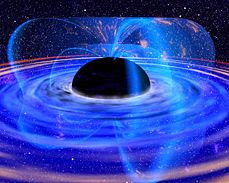
Obviously, there is no singular definitive answer to this question (that I know anyway.) I am not a space bot that can travel in time to find the source. But, amazing theorists have ideas; and I, being a pursuer of shaking my own ignorance - read what they have to say.
I started my exploration tonight with an article on MSN about a flare out of the center of our galaxy, the Milky Way. The article discusses how X-rays are expelled from the center of our galaxy, and a group of Japanese scientists have analyzed clouds of this dispersing residue in order to conclude the timing in which our galaxy did this last (presumably to theorize about if and when it will happen again as well as to understand it's origin.)
Leading me to research the definition of a quasar , which turns out to be the condensed term used to describe a galaxy whose black hole is currently active, or 'feeding excessively'; this activity being the result of far more active mass consumption than is currently the case in our galaxy. Some theorists suggest that our galaxy either once was or is on some sort of rotation of quasar like activity followed by the more subdued behavior we currently witness (as a sort of resting period.)
This led me to the question that is the title of this post. I learned a few days back about planets turning into black holes. O.k. that has been registered… But, why on earth are black holes the center of galaxies? And large (or gigantic) black holes, at that. Leading me to a definition on various types of black holes or theories of their creation and (here it is) the bid bang theory. A mentioning of the theory of primordial black holes, the hypothesis that they were initially dispersed into the universe at the big bang and eventually ended up becoming galaxies (the 'eventually' portion is for further research :)
Which leads me to a wonderful site discovery; the site is a non profit scientific study/findings e-service provided by Cornell University
Alas, always in need of more time.
KAS